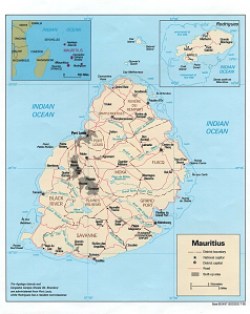For general information about the country profiles click here.
 Population: 1,291,456
Population: 1,291,456
HDI ranking: 80/187
HDI score: 0.737
As a small multiracial island country, Mauritius boasts the top rank in democratic governance and economic governance in Africa. Mauritius is a constitutional republic with a decentralized system of government structures that govern the country’s small island dependencies including Rodrigues Island, the largest dependency with its own government (Freedom House, 2012; CLGF, 2013).
Local governance at a glance
- Mauritius has three tiers of government: central, local, and village government. There is no constitutional provision for local government other than the Rodrigues Regional Assembly (CLGF, 2013).
- The local government in Mauritius has two tiers: the urban councils, known as municipalities, and rural authorities (called district councils) which oversee village councils. Currently, there are 5 municipal councils covering 7 geographical areas. In the rural areas, there is currently a two-tier system of seven district councils and 130 village councils (CLGF, 2013).
- The Ministry of Local Government and Outer Islands (MLGOI) is responsible for overseeing local authorities in Mauritius (CLGF, 2013).
- The 2011 Local Government Act (LGA) provides for the holding of municipal council and village council elections every six years. CLGF (2013) states that District councilors are elected indirectly by secret ballot from members of village councils (CLGF, 2013).
- Village councils are required to hold monthly meetings for general business. They have a part-time chair who is elected every two years in a secret ballot by the village councilors (CLGF, 2013).
- The 2011 LGA states that “a list of reserve candidates for the election of municipal city councilors, municipal town councilors or village councilors, for the purpose of filling any vacancy which may occur between two elections, shall not comprise more than two-thirds of persons of the same sex and not more than 2 consecutive candidates on the list shall be of the same sex” (Quota Project, 2014).
Civil society actors include
- The Allied Network for Policy, Research & Actions for Sustainability (ANPRAS) works to promote the concept of sustainable living at the grassroots level through community driven actions, and encourages policy research and academic publications primarily focused on sustainable development (ANPRAS, 2013).
- The Mauritius Council of Social Service (MACOSS) is an umbrella organization for NGOs that seeks to promote social and community development and voluntary actions through non-governmental organisations (MACOSS, 2012).
Capacity building institutions
- There are currently two local government associations in Mauritius: the Association of Urban Authorities and the Association of District Councils uniting local governments on various issues (CLGF, 2013).
- The Ministry of Local Government and Outer Islands (MLGOI) works to empower and provide appropriate support to Local Authorities to enable them to manage the affairs of the local communities effectively and efficiently. The MLGOI also works to foster vibrant local democracy and promotes effective, transparent and proactive delivery of services by local governments (MLGOI, n.d.).
Fiscal control
- Municipal and district councils are empowered to raise revenue through the following fees: building and land use permits, trade, markets, cemeteries, scavenging, traffic fees and advertisements. Municipal councils can also raise revenue through a general (property) rate (CLGF, 2013).
- The annual ‘grant in aid’ for all local authorities is voted in as part of the budget of the MLGOI at the beginning of the financial year which is distributed in monthly installments to each local authority (CLGF, 2013).
Key initiatives for participatory local governance
- The LGA of 2011 specifically provides for formal consultation processes with civil society on local governance issues, and it provides for the holding of municipal council and village council elections every six years (CLGF, 2013).
- In 2012, the government in collaboration with local authorities launched an e-government portal for local authorities which allows members of the public to access information, make applications and inquiries and file complaints via the portal (CLGF, 2013).
Challenges for participatory local governance
- Political representation and participation of women remain low despite the legal provisions. Despite equality in education, the attitudes that prevent women’s participation remain unchanged (Bunwaree and Kasenally 2005 ).
- Despite the relative decentralized fiscal control system, financial estimates for local authorities must be approved by the MLGOI. The MLGOI also approves the disbursement, withdrawal, and reallocation of funds. The writing off of bad debts also require the approval of the minister (CLGF, 2013).
Recent posts on this website about this country:
- Yes Africa can : success stories from a dynamic continent (2011)
- Mauritius local government gender action plan manual (2007)
- Local governance and ICTs research network for Africa (LOG-IN Africa) = Le réseau de la gouvernance locale et de recherches en TICs pour l’Afrique (2006)
List of sources :
Allied Network for Policy, Research & Actions for Sustainability (ANPRAS), 2013: http://www.anpras.org/.
Bunwaree, S. & Kasenally, R., 2005: “Political Parties and Democracy in Mauritius.”
Commonwealth Local Government Forum (CLGF), 2013: “The local government system in Mauritius.”
Freedom House, 2012: “Mauritius.”
Mauritius Council of Social Service (MACOSS), 2012: http://www.macoss.intnet.mu/.
Ministry of Local Government and Outer Islands (MLGOI), n.d.: http://localgovernment.gov.mu/English/AboutUs/Pages/Mission-and-Vision.aspx.
Quota Project, 2014: “Mauritius.”
United Nations Development Program (UNDP), 2013: “Mauritius : Human Development Report 2013.”
